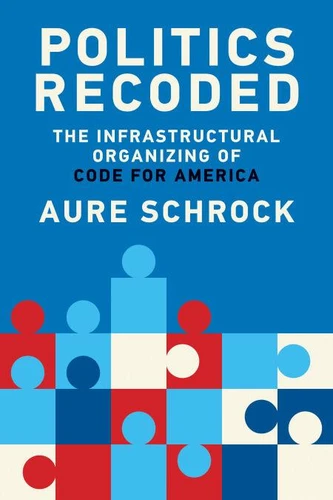Politics Recoded. The Infrastructural Organizing of Code for America
Par :Formats :
Disponible dans votre compte client Decitre ou Furet du Nord dès validation de votre commande. Le format ePub protégé est :
- Compatible avec une lecture sur My Vivlio (smartphone, tablette, ordinateur)
- Compatible avec une lecture sur liseuses Vivlio
- Pour les liseuses autres que Vivlio, vous devez utiliser le logiciel Adobe Digital Edition. Non compatible avec la lecture sur les liseuses Kindle, Remarkable et Sony
- Non compatible avec un achat hors France métropolitaine
 , qui est-ce ?
, qui est-ce ?Notre partenaire de plateforme de lecture numérique où vous retrouverez l'ensemble de vos ebooks gratuitement
Pour en savoir plus sur nos ebooks, consultez notre aide en ligne ici
- Nombre de pages250
- FormatePub
- ISBN978-0-262-38068-3
- EAN9780262380683
- Date de parution24/09/2024
- Protection num.Adobe DRM
- Taille5 Mo
- Infos supplémentairesepub
- ÉditeurThe MIT Press
Résumé
The first detailed history of Code for America that examines how democratically designed government systems can collectively improve technology's impact on society. For decades, tens of thousands of volunteers and employees of Code for America have taken a different path to institutional change: through designing and implementing infrastructure. In Politics Recoded, Aure Schrock employs a robust, organizational ethnography to analyze how Code for America's infrastructural organizing changed how politics get exercised, showing how we citizens can work directly with the government on projects to improve our collective livelihoods.
Drawing from theories of organizing, social infrastructure, racialized organizations, technical cultures, and intersectionality, Schrock argues that our "post-techlash society" must no longer presume that corporate platforms or social networks can level social inequities. An underrecognized yet influential organization, Code for America emerged from a tech culture background that prioritized networks and publicity over the long, slow work of institutional change.
But its evolution demonstrates how to push beyond the fundamental flaws of tech-forward organizing. This, the first history of Code for America, shows how promoting agentic citizenship and brokering in empathy let the organization influence policy at all levels of government-and demonstrates why we need to bolster institutions to ensure that everyone is justly represented and receiving the benefits.
Appealing to those in political science, communication, and information studies, Politics Recoded will empower practitioners and activists to revolutionize technological design and participate in alternative forms of civic engagement.
Drawing from theories of organizing, social infrastructure, racialized organizations, technical cultures, and intersectionality, Schrock argues that our "post-techlash society" must no longer presume that corporate platforms or social networks can level social inequities. An underrecognized yet influential organization, Code for America emerged from a tech culture background that prioritized networks and publicity over the long, slow work of institutional change.
But its evolution demonstrates how to push beyond the fundamental flaws of tech-forward organizing. This, the first history of Code for America, shows how promoting agentic citizenship and brokering in empathy let the organization influence policy at all levels of government-and demonstrates why we need to bolster institutions to ensure that everyone is justly represented and receiving the benefits.
Appealing to those in political science, communication, and information studies, Politics Recoded will empower practitioners and activists to revolutionize technological design and participate in alternative forms of civic engagement.
The first detailed history of Code for America that examines how democratically designed government systems can collectively improve technology's impact on society. For decades, tens of thousands of volunteers and employees of Code for America have taken a different path to institutional change: through designing and implementing infrastructure. In Politics Recoded, Aure Schrock employs a robust, organizational ethnography to analyze how Code for America's infrastructural organizing changed how politics get exercised, showing how we citizens can work directly with the government on projects to improve our collective livelihoods.
Drawing from theories of organizing, social infrastructure, racialized organizations, technical cultures, and intersectionality, Schrock argues that our "post-techlash society" must no longer presume that corporate platforms or social networks can level social inequities. An underrecognized yet influential organization, Code for America emerged from a tech culture background that prioritized networks and publicity over the long, slow work of institutional change.
But its evolution demonstrates how to push beyond the fundamental flaws of tech-forward organizing. This, the first history of Code for America, shows how promoting agentic citizenship and brokering in empathy let the organization influence policy at all levels of government-and demonstrates why we need to bolster institutions to ensure that everyone is justly represented and receiving the benefits.
Appealing to those in political science, communication, and information studies, Politics Recoded will empower practitioners and activists to revolutionize technological design and participate in alternative forms of civic engagement.
Drawing from theories of organizing, social infrastructure, racialized organizations, technical cultures, and intersectionality, Schrock argues that our "post-techlash society" must no longer presume that corporate platforms or social networks can level social inequities. An underrecognized yet influential organization, Code for America emerged from a tech culture background that prioritized networks and publicity over the long, slow work of institutional change.
But its evolution demonstrates how to push beyond the fundamental flaws of tech-forward organizing. This, the first history of Code for America, shows how promoting agentic citizenship and brokering in empathy let the organization influence policy at all levels of government-and demonstrates why we need to bolster institutions to ensure that everyone is justly represented and receiving the benefits.
Appealing to those in political science, communication, and information studies, Politics Recoded will empower practitioners and activists to revolutionize technological design and participate in alternative forms of civic engagement.



